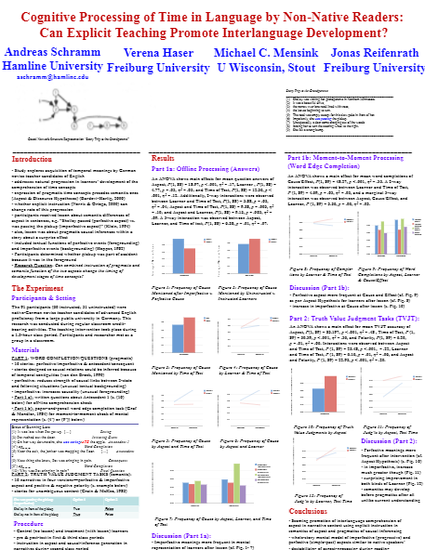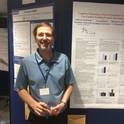
Presentation
Cognitive Processing of Time in Language by Non-Native Readers: Can Explicit Teaching Promote Interlanguage Development?
15th International Pragmatics Conference
(2017)
Abstract
Every English sentence requires a verb containing information about time. This in turn makes the temporal meanings that verbs carry crucial. The current study is part of a larger research interest into the nature of cognitive processing of time in language by native and non-native readers of English (Becker, Ferretti, & Madden_Lombardi, 2013; Schramm & Mensink, in press). It explores the acquisition of temporal meanings by adult non-native speakers of English. It specifically addresses the natural progression in learners’ development of the comprehension of time concepts (not only of their production) and whether instruction can change the rate of this progression. Following a previous study (Kivimagi, 2013), German novice teacher candidates are studied before and after they are taught about semantic differences of aspect in sentences such as “Shelley passed (perfective) vs. was passing the pickup (imperfective)” and subsequent causal inferences within a story about an accident (Tzeng & v. d. Broek, 1997). They need to determine whether the pickup was part of the accident in the story because it was in the foreground. This is a challenge for speakers of languages without morphosyntactic aspect, such as German. Researchers know little about whether learners’ early understanding of the textual functions of perfective events, i.e., foregrounding, and imperfective events, i.e. backgrounding (Hopper, 1982), as well as the later stage of understanding the semantic concepts behind the textual functions (Klein, 1994), can be influenced through an explicit teaching intervention (Norris & Ortega, 2000).
In the current experiment, 120 teacher candidates at Freiburg University, read 16 stories following the above pattern, complete partial words (Greene, 1986), and answer questions about the stories. The word completion task, during which readers complete partial words on a separate page, provides access to the level of activation of information in working memory. This measure investigates whether learners attend to, or “notice”, aspectual meanings and thus whether causal inferencing impacts memory. Question answers probe into readers long-term memory contents. Half of the participants receive the teaching intervention, and all of them are re-tested after three and six months to see if the lesson changed their semantic and pragmatic understanding of stories. Semantic understanding of the aspects is investigated also both times, using Truth Value Judgment Tasks (TVJT; Slabakova, 2012).
The experiment contains a 2 (learner: instructed/non-instructed) x 2 (aspect: imperfective/perfective) x 2 (causality: cause/effect) mixed design. At the end of each story, there are a multiple-choice TVJT and a comprehension question. ANOVAs and planned comparisons will be conducted. We predict that results will extend preliminary results from Wytaske (2016): The effect of teaching imperfective aspect will boost working-memory awareness and long-term memory in the interim, but will subside eventually. Explicit instruction of aspect may promote development and potentially acquisition. Results will also be compared with results from a previous experiment involving non-instructed Saudi-Arabian learners. Implications for approaches to language teaching will be discussed.
Keywords
- aspect,
- second language acquisition,
- causal inferencing,
- text comprehension,
- explicit teaching
Disciplines
Publication Date
August, 2017
Location
Belfast
Citation Information
Andreas Schramm, Verena Haser, Michael Mensink and Jonas Reifenrath. "Cognitive Processing of Time in Language by Non-Native Readers: Can Explicit Teaching Promote Interlanguage Development?" 15th International Pragmatics Conference (2017) Available at: http://works.bepress.com/andreas-schramm/2/
